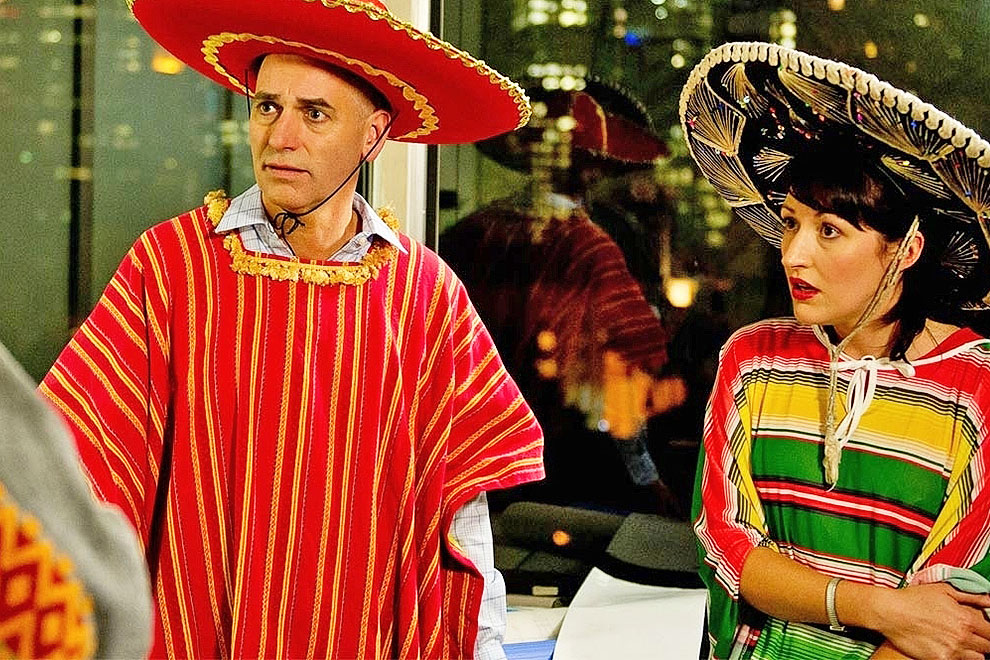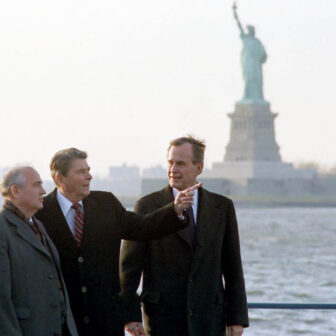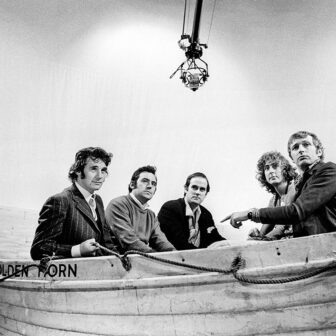As Australia Day passes, our children return to school and we leave the lazier days of summer behind, the non-ratings period comes to an end and television producers get back behind the wheel. Many of us rely heavily on our DVD shelves during December and January and may be keen to reconnect with live-to-air offerings, but there’s one item from my collection that’s calling out for a replay.
The first and second series of Utopia are on the bestseller shelves at ABC shops, alongside the scripts published late last year by Harper Collins. Wary as I am of making promotional statements, I’d recommend that you get in there and buy the lot. It’s one of those series that gets better on second – and even third – viewing. The scripts, by Working Dog team Santo Cilauro, Tom Gleisner and Rob Sitch, are state-of-the-art exemplars of contemporary television comedy. Each episode is as deftly structured as Fawlty Towers: there’s not a detail that isn’t woven into the plotline, ready to return with a twist at some critical moment.
And besides that, it’s the best back-to-work orientation kit anyone could ask for. Set in the offices of the NBA (Nation Building Authority), this is essentially a situation comedy about the impossibility of doing work at work. If you are going quietly nuts at the prospect of spending another year sitting at a table with a bowl of mints and a fan of coloured markers, earnestly preparing to whiteboard the next vision statement or brainstorm the new key performance indicators, this is the medicine for you.
Rob Sitch, playing CEO Tony Woodford, dreams of getting something done: building a road, at least, or a fence to define the perimeter of a development site. He is aided by his stalwart deputy, Nat (Celia Pacquola), but their concerted attempts to deliver outcomes are confounded at every turn. On one level, they are up against a suite of petty obstructions of the kind that might turn anyone’s working day into a farce. The email is down, the swipe cards don’t work, the passwords are disabled, a fanatical barista has taken charge of the coffee machine, and the new app keeping track of appointments is feeding the alerts into the wrong devices.
Then there are some rather more substantive distractions. Like a week-long staff training program run by a visiting guru who wants everyone outside on the lawn doing group bonding exercises. Occupational health and safety compliance is an all-engulfing commitment for another week and, of course, there is the staff party, with a Mexican theme – an enterprise so ambitious that it overrides all other concerns.
These shenanigans, presided over with air-headed vivacity by office manager Amy (Michelle Lim Davidson), are a mere sideshow compared to the roadblocks presented by PR manager Rhonda (Kitty Flanagan), who whirls about syphoning up the energy of the place in an overriding quest for the perfect marketing pitch. “When no is just the first syllable in knowledge. When dreams break free of their foundations…” Rhonda tweets press releases under the desk in meetings, translating everything that is said into newspeak. She hauls in mood boards, and demands immediate attendance for a brain shower to focus on the rebranding initiative.
Enthusiasms seem to change with the wind. Projects are announcement-driven, visions are goals in themselves. It’s a radical case of inverted priorities, reinforced by the ever-smiling Jim (Anthony Lehmann), a liaison officer who pops in and out to deliver the government’s verdict on where the NBA should be heading on any particular issue at any given moment. At the end of series one, as Tony and Nat confer on the likelihood they will be closed down because of a comprehensive failure to actually get anything done, Jim turns up and delivers the news: they are to be upgraded and expanded. “A big country calls for big ideas, big dreams, big vision… together we are Nation Building Australia.”
The theme of major infrastructure in Utopia may have hit a national nerve. As a big country, we have a conspicuous record of failing to do big things, or of doing the wrong ones, especially when it comes to transport. Light rail and the cross-city tunnel have proved to be disasters in more than one capital city. But what about an interstate bullet train? An efficient freight system? A new container terminal? Such possibilities remain an elusive dream for Tony. He’d just like to get started on a road somewhere, but it’s not going to happen.
Series one of Utopia premiered on ABC in August 2014, in the middle of Tony Abbott’s brief term as the self-declared infrastructure prime minister. As the first couple of episodes went to air, Abbott was being goaded for his failure to deliver on the boast. “One Year On, Infrastructure Prime Minister Still Poised With a Shovel,” ran the headline of an influential article by Peter van Duyn, who cited an Australian Logistics Council estimate that a 1 per cent increase in the efficiency of transport infrastructure would boost GDP by $2 billion. Well, that wasn’t going to happen, was it? And evidently it still isn’t.
Analogies between the paralysis of the workplace and the paralysis of government are intricately suggested in Utopia, but the series is not an exercise in political invective. Although Tony Abbott’s voice forms part of the vocal collage over the opening titles of the program, there is no attempt to satirise the policies and practices of any particular government.
Scriptwriters Cilauro, Gleisner and Sitch have steered close to political satire before, notably in The Hollow Men (2008), but their prime target here is the culture of workplaces. Utopia belongs to a genre of the office comedy defined by John Clarke and Bryan Dawe in The Games (1998 and 2000). The script for Utopia bears some of the hallmarks of the Clarke/Dawe style – a deft way with the rhythms of dialogue, a capacity to make subtle comedy out of misfired communication, and a brilliant sense of level. Nothing is overpitched, and the tension builds through the sheer technical skill with which each episode is structured.
This is in contrast to a long tradition of sitcoms that depends on the overblown or hysterical personality as a catalyst. Lucille Ball (I Love Lucy) is the prototype in the American tradition, Basil Fawlty (Fawlty Towers) in the British. With his creation of the excruciating David Brent in The Office, Ricky Gervais belongs in this mode too. While it is not personality-driven in that way, Utopia is populated by an array of vital personalities. Rob Sitch’s Tony, at the centre of the forcefield, is a relatively subdued figure, whose reactions to an unrelenting stream of frustrations hardly produce a blip on the Richter scale. This leaves plenty of scope for those around him to cause the turbulence, but it’s a clever strategy to ensure that the most disruptive people are also the most charming. The cast as an ensemble are pitch-perfect.
One of the criticisms I’ve heard of the series is that it’s too real to be funny, but that’s also a compliment. As Tom Gleisner said in an interview, “We don’t write satire, we make observations.” As a team, Gleisner, Cilauro and Sitch have an eye for situations that are beyond satire. We don’t need them to tell us that we inhabit a cultural environment in which everything is in the service of promotion and promotion is an end in itself, but they offer a brilliant portrayal of how this works on a day-to-day basis.
The real world (if we can call it that) has obligingly responded with an ironic counterpoint to coincide with each stage of the series, from its inaugural week, with the infrastructure prime minister failing to lift his shovel, to its closing episodes, as Malcolm “there-has-never-been-a-more-exciting-time” Turnbull took over. Perhaps the new PM wasn’t aware that he was repeating one of Rhonda’s favourite catchphrases, or that she and her kind would be whispering “Love it!” as he announced his Innovation Crusade. And as for the anointed crusader, what casting director could have done better than Christopher Pyne, who pronounced himself “instinctively and reflexively excited about innovation”? Pyne should be joining the scriptwriting team at Working Dog. Or is it, perhaps, that Rhonda has taken up a position in his office? And who better to be in charge of Nation Building than our current prime minister, as he prepares to get back to work ready for the first 2016 sitting of parliament? •




